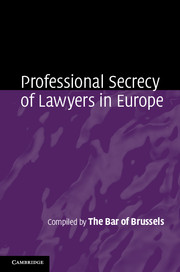Book contents
- Frontmatter
- Contents
- Contributors
- Preface
- 1 Professional secrecy in Europe
- 2 The CCBE rules on professional secrecy
- 3 Austria
- 4 Belgium
- 5 Bulgaria
- 6 Cyprus
- 7 Czech Republic
- 8 Denmark
- 9 Estonia
- 10 Finland
- 11 France
- 12 Germany
- 13 Greece
- 14 Hungary
- 15 Iceland
- 16 Ireland
- 17 Italy
- 18 Latvia
- 19 Liechtenstein
- 20 Lithuania
- 21 Luxembourg
- 22 Malta
- 23 The Netherlands
- 24 Norway
- 25 Poland
- 26 Portugal
- 27 Romania
- 28 Slovakia
- 29 Slovenia
- 30 Spain
- 31 Sweden
- 32 Switzerland
- 33 United Kingdom
- Index
- References
26 - Portugal
Published online by Cambridge University Press: 05 June 2013
- Frontmatter
- Contents
- Contributors
- Preface
- 1 Professional secrecy in Europe
- 2 The CCBE rules on professional secrecy
- 3 Austria
- 4 Belgium
- 5 Bulgaria
- 6 Cyprus
- 7 Czech Republic
- 8 Denmark
- 9 Estonia
- 10 Finland
- 11 France
- 12 Germany
- 13 Greece
- 14 Hungary
- 15 Iceland
- 16 Ireland
- 17 Italy
- 18 Latvia
- 19 Liechtenstein
- 20 Lithuania
- 21 Luxembourg
- 22 Malta
- 23 The Netherlands
- 24 Norway
- 25 Poland
- 26 Portugal
- 27 Romania
- 28 Slovakia
- 29 Slovenia
- 30 Spain
- 31 Sweden
- 32 Switzerland
- 33 United Kingdom
- Index
- References
Summary
Preliminary note
The Portuguese Bar Association's Statute (Professional Statute), laid down in Decree-Law no 84/84 of 16 March 1984, amended by Law 6/86 of 23 March 1986, then Decree-Law no 119/86 of 28 May 1986, Decree-Law no 325/88 of 23 September 1988, Law 33/94 of 6 September 1994, Law 30E/2000 of 20 December 2000 and Law 80/2001 of 20 July 2001, currently lies in Law 15/2005 of 26 January 2005.
Keeping professional secrecy is a professional duty described by Article 87 of Law 15/2005, a duty before the client but also between lawyers. This specific duty between professionals regards all facts given by the opposite party or its representative during preliminary negotiations (oral or written) – even if a party is not assisted by another lawyer, it involves confidence through the legal professional's intervention.
Modern society accepts that trust be placed in legal professionals, within their ethics and ethical procedures and mostly due to professional secrecy. There is an old saying in Portugal that ‘every truth must be unveiled, both to a lawyer and to a priest’. Professional secrecy is set upon a public-order interest, not an agreement. All the Bar’s jurisprudence reflects this, through many decisions rendered by the General Council and the Superior Council, throughout history.
In Portugal, every lawyer is compulsorily registered at the Bar Association and is under a duty of professional secrecy. Only legal professionals admitted to the Bar are entitled to use the title of lawyer and to act in court.
- Type
- Chapter
- Information
- Professional Secrecy of Lawyers in Europe , pp. 441 - 459Publisher: Cambridge University PressPrint publication year: 2013



